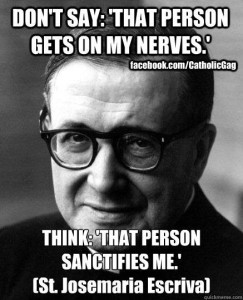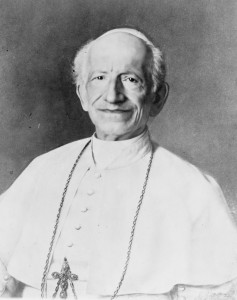
Pope Leo XIII
We started That Man Is You! two weeks ago at my parish. This session started out with the program’s founder, Steve Bollman, telling a compelling story regarding the authoring of the famous prayer to Saint Michael the Archangel. This piqued my interest, as I have held a special affinity toward Saint Michael and I had never heard the origin of this prayer before.
A Pope, A Vision, A Prayer
The story centers around Pope Leo XIII, who was said to have witnessed a prophetic vision of a conversation between the Lord and Satan regarding the future of the Church. There are several retellings of this story (more on this later) but I found a synopsis on Wikipedia that approximates Steve Bollman’s retelling, so I will use it here:
Pope Leo XIII was climbing the steps to the altar when he suddenly stopped, stared fixedly at something in the air and with a terrible look on his face, collapsed to the floor (some accounts say he fell shrieking). The Pope was carried off by those around him to another room where he came around. As one rendition of the story tells it:
“When asked what had happened, he explained that, as he was about to leave the foot of the altar, he suddenly heard voices – two voices, one kind and gentle, the other guttural and harsh. They seemed to come from near the tabernacle. As he listened, he heard the following conversation:
- The guttural voice, the voice of Satan in his pride, boasted to Our Lord: “I can destroy your Church.”
- The gentle voice of Our Lord: “You can? Then go ahead and do so.”
- Satan: “To do so, I need more time and more power.”
- Our Lord: “How much time? How much power?”
- Satan: “75 to 100 years, and a greater power over those who will give themselves over to my service.”
- Our Lord: “You have the time, you will have the power. Do with them what you will.”
A powerful story, no doubt… and fascinating. I wanted to find out more.
Some Confusing Research
After I got home from work that night, I began doing some digging and found some peculiar results. It seems the Saint Michael prayer is the source of some controversy in Traditionalist circles, who claim that the “original” version of the prayer was shortened without explanation in 1934. This interested me even further, and I wanted to read the text of the original version of this prayer in it’s entirety… ideally from a Vatican-approved source. (It is, after all, good practice to verify one’s source when investigating something.)
I found out that Pope Leo instituted his Leonine prayers to be added after every Low Mass in 1884. Citations indicate that the Saint Michael prayer was first added in 1886 [note: I have not located a copy of Acta Sanctae Sedis or Irish Ecclesiastical Review 7 in English that is referenced, therefore this is unverified until such a time as an antique book dealer contacts me]. Many websites cited a source from the Raccolta, an official collection of indulgenced prayers that was published and revised often up until 1957. It seems that a longer prayer to Saint Michael started to appear in the 1888 edition of this book, and continued until the aforementioned shorter version usurped it in 1934. You can see a copy of this longer prayer, and a citation to a motu proprio letter from September 23, 1888 in this digital copy of the 1910 edition of the Raccolta. I can’t find even a single copy of the text of the referenced motu proprio letter… but there is a significant chance that I just don’t know where to find such a thing. The fact that it is referenced by the 1910 Raccolta will do for my curiosity level.
Regardless… these dates don’t seem to make sense. The Traditionalist claim that the “original” Saint Michael prayer is the same one I linked above from the Raccolta. So what prayer were people saying between 1886 and 1888?
I found my answer in two excellent articles by Rev. Anthony Cekada (article 1 and article 2) that confirmed my hunch. We’re actually looking at two prayers here, the original shorter one that we all know and love (in the original Latin via Irish Ecclesiastical Review 7) and the longer version from 1888.
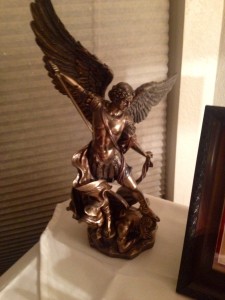
Saint Michael the Archangel
Back to that vision
In his second article, Father Cekada goes on to outline the different accounts of Pope Leo’s vision. Some were undated, some accounts referred to 1880, 1884, and 1888. Some have Pope Leo collapsing at the foot of the altar, some after a conference with the bishops, one account has him attending the Mass and not celebrating the Mass. These accounts are deftly captured in the article I linked before, if you’re interested in reading them please take a few minutes to see them there. It seems the accounts vary and the story has grown over the years as it was passed around.
Does this cast doubt on the exciting tale of Pope Leo’s vision? Perhaps, but this is the precise reason why you don’t have the Church ruling too often on the value of private revelations. The fact that Pope Leo XIII did not recount this story on his own does nothing to confirm or deny the fact that this actually happened. One theory I particularly enjoy is that the vision did happen, and the longer Saint Michael prayer is a result of that sobering experience.
Why none of this matters
All stories, accounts, conspiracies, and citations aside… none of this matters much to me. Why? Because these prayers (both the short and the long) are still profound, beautiful, and act as strong tools in one’s spiritual arsenal. The shorter prayer can be easily memorized, and even the first two lines are a perfectly fine exhortation against evil and plea for protection: Saint Michael the Archangel, defend us in battle!
The longer prayer isn’t exactly a candidate for memorization (at least, not if you’re me!) but I am certain it is useful if you are struggling with a particularly thorny spiritual battle and needed the grace of such an intense, forceful, and evocative prayer.
As with any prayer, the most important thing is that you pray and that Saint Michael’s intercession brings you closer to Christ. Saint Michael acts as a mirror for the ultimate defense and the ultimate spiritual power that is our faith in Christ Jesus.
Saint Michael the Archangel,
defend us in battle;
be our protection against the wickedness and snares of the devil.
May God rebuke him, we humbly pray:
and do thou, O Prince of the heavenly host,
by the power of God,
thrust into hell Satan and all the evil spirits
who prowl about the world seeking the ruin of souls.
Amen.
The text of the longer prayer to Saint Michael can be found here.






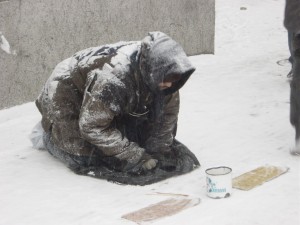
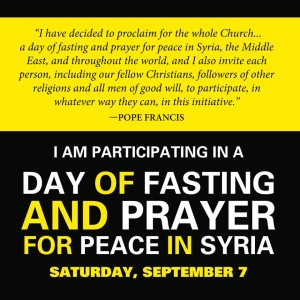
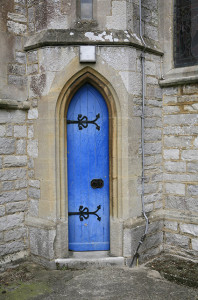 Today’s Gospel reading was one I had heard many times, where Saint Luke recounts Christ’s answering of the question “will many be saved?”:
Today’s Gospel reading was one I had heard many times, where Saint Luke recounts Christ’s answering of the question “will many be saved?”: